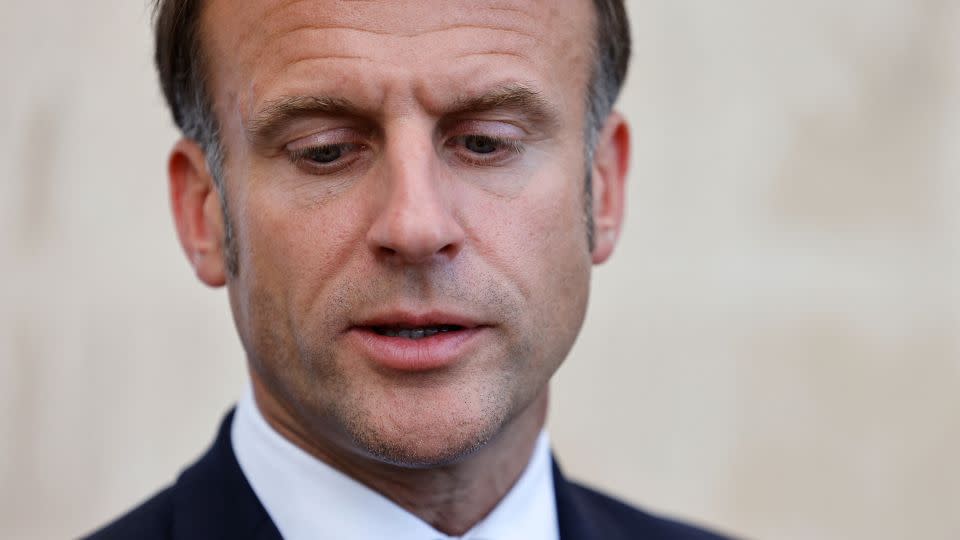Markets fear the French far right could trigger a financial crisis
Investors are worried France could be facing a financial crisis if the political center collapses in upcoming parliamentary elections, leaving far-right populists in charge of the European Union’s second-biggest economy.
President Emmanuel Macron called the snap elections Sunday after his party lost to the far right in a vote for EU lawmakers, a shock move that rattled markets for French stocks and government bonds.
There has been widespread speculation since then that the National Rally, the party of far-right doyenne Marine Le Pen, is poised to become the most powerful force in parliament, unseating Macron’s centrist bloc.
Such an outcome could make it harder to reduce France’s huge government debt pile, equal to 110.6% of gross domestic product at the end of last year, and could even add to it. A bitterly divided parliament would also struggle to cut the budget deficit — the gap between government spending and tax receipts — which reached 5.5% of GDP last year.
“If Le Pen calls the shots in parliament and pursues major parts of her expensive fiscal and protectionist ‘France first’ agenda, the result could be a Liz Truss-style financial crisis,” Berenberg economists wrote in a note Friday, adding that, for now, this was “a serious risk, not a forecast.”
The British pound and UK government bonds sold off sharply in September 2022 after former Prime Minister Truss unveiled plans to increase borrowing to pay for tax cuts. Mortgage rates soared as investors demanded much higher premiums for owning UK debt. Truss resigned soon after, becoming the shortest-serving prime minister in British history.
The risk of something similar happening in France is real, according to the country’s finance minister, Bruno Le Maire.
Asked Friday on franceinfo, a French radio station, whether the political turmoil triggered by Macron’s decision to call the snap elections could lead to a financial crisis, Le Maire replied “yes.”
He noted that France now has to pay a higher interest rate than Portugal — one of the countries bailed out during the European debt crisis more than a decade ago — to borrow from investors. “This comes down to the (parties’) plans that are on the table, whether we can, yes or no, finance this debt,” Le Maire said.
Credit ratings agencies are already keeping a close eye on France, one of the EU’s three most-indebted countries. In May, S&P downgraded the country’s long-term credit score to AA-, citing the “deterioration of (its) budgetary position,” though it still thought France had ample capacity to repay its debts. The agency said it expected the budget deficit to narrow to 3.5% of GDP in 2027, well above the 2.9% targeted by the current government.
Markets are already roiled by the prospect of political upheaval. The yield, or the interest rate sought by investors, on France’s benchmark 10-year government bonds stood at 3.17% on Friday afternoon in Europe, compared with 3.15% for the Portuguese equivalent.
In another sign of traders’ jitters, the premium they demand to hold French government bonds instead of the ultra-safe AAA-rated German equivalents rose Thursday to its highest level since 2017. The spread was widening even further Friday.

Stock markets haven’t escaped. On Friday, France’s benchmark of 40 leading stocks fell much more than similar German and pan-European indexes. The euro has sagged this week too.
An Elabe opinion poll for CNN affiliate BFMTV and La Tribune Dimanche showed Wednesday that Macron’s centrist bloc was on track to come only third in the first round of the elections on June 30, far behind the National Rally and an alliance of left-wing parties.
The National Rally has promised to raise public spending and slash VAT on electricity and fuel. Le Maire said Friday that markets’ response to such measures would be: “I’m sorry but you don’t have the means to afford these expenses.”
Likewise, speaking on a webinar Thursday, Frank Gill, a senior specialist in European sovereign ratings at S&P Global Ratings, said the policies advocated by the National Rally “could further drag on public finances” and “would be a consideration for the sovereign rating.”
And Moody’s said in a note Monday that the snap elections increased the risks to fiscal consolidation in France, “a credit negative.”
The European Central Bank “would have the means to prevent any genuine crisis” in the French government bond market, a Berenberg note said earlier this week. But “akin to the sequence of events in the erstwhile euro crisis, the ECB may only deploy its instruments — or announce that it could do so — if and when the country in question has returned to sounder fiscal policies.”
Joseph Ataman in Paris and Mark Thompson in London contributed reporting.
For more CNN news and newsletters create an account at CNN.com

 Yahoo Finance
Yahoo Finance 